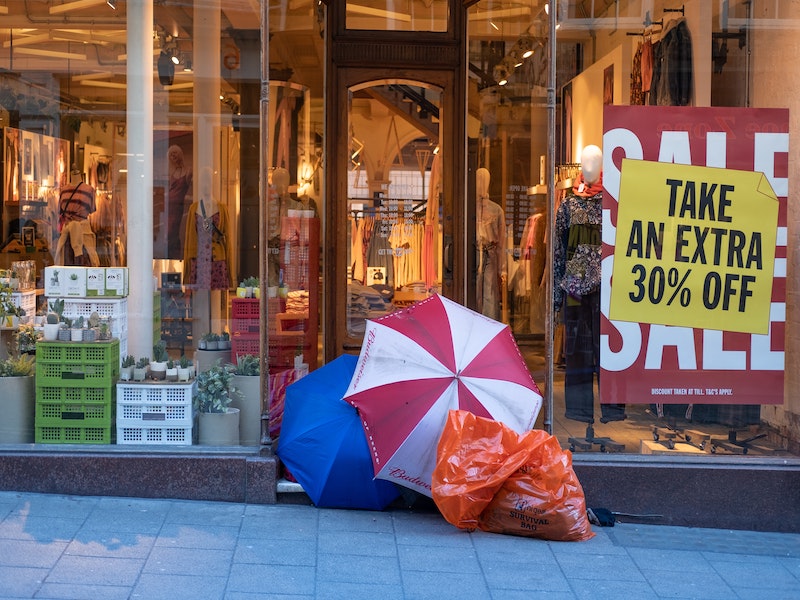It’s no good decarbonising an economy that doesn’t lead to mutual happiness
From ghettos to mansions; from starvation to gluttony; from million-dollar bonuses to pennies in sweatshops — capitalism has always been a system of extremes. In the West, efforts to create a sustainable society revolve around decarbonising the economy by achieving net zero by 2050. The assumption is that capitalism works just fine, all we need to do is decouple emissions from economic activity, and our problems will be solved. So does the assumption hold any weight? Or, to put it another way, would we even want to if we could sustain capitalism?
To answer the question, we need to consider some characteristics that define modern ‘western’ capitalism. A foundation of capitalism is that entrepreneurs (capitalists) own the means of production privately. Ownership gives capitalists the authority to manage the production process, direct the labour force, and make investment decisions — all guided by monetary calculations and focused on the goal of profit maximisation. Owning the means of production makes capitalists extremely wealthy, influential, and powerful.
It’s no good owning the means of production if no one is working to produce the stuff you own, so another essential characteristic is free labour. The labour force sells their labour on the market for a wage; this means employers can estimate production costs in advance. Now the ‘free’ element of labour is crucial. In modern society, the market provides the freedom to pursue whatever career you want; you’re also free to choose not to work at all. But underlying the motivation to work is an awareness of the consequences of our actions.
On the one hand, there is the stick — fear. The fear of losing your job, the fear of homelessness, the fear of being poor, the fear and stigma of not conforming, and the fear of losing social status. What compounds the fear is that capitalism is intertwined with individualism. You are in it all alone. Sure, you don’t have to work, but everyone knows all too well that the consequences of not doing so are a life of suffering and hardship.
On the other hand, there is the carrot — opportunity. In the market, there are endless possibilities to make your fortune and enhance your social status. As terrifying as the fear is, the opportunity to create your fortune is intoxicating. The choice is yours, and so are the consequences. You either sink into the doldrums of debt and despair, swim into the clutches of the haves, or, in the majority of cases, keep your head floating above the water, living precariously from check to check, knowing all too well that there is no safety net to protect you should you get fired from your job, have an accident, or the countless other ways your income could soon dry up.
Given success is arranged around the individual, the higher your wage, the more prestige and respect you’re given within society. The characteristics that are most likely to see you reach the top include being ruthless, selfish, cunning, greedy, hyperproductive, self-serving, and showing a total disregard for the feelings of others — essentially exhibiting every negative trait humans possess. It’s why the market is so dog-eat-dog because if you’re not ruthless enough, someone else will be; such is the tantalising prize should you get to the top.
It doesn’t sound like much fun to be part of the labour force. Yet, plenty of optimistic cheerleaders have nothing but enthusiasm for our current approach to sustainability while ignoring the extremes produced by capitalism. It’s a fair assumption to say their positivity in the face of worsening environmental impacts means they tend to benefit from the system as it is. But what about all of those who don’t? What about those on zero-hour contracts? What about those in the developing world who work in sweatshops? What about those starving and unable to afford food? What about those going cold and hungry, unable to afford to keep the lights on? Should they be looking forward to this decarbonised ‘sustainable’ world? Or will they continue to suffer in silence as the capitalist show goes on?
The victims of capitalism don’t tend to prioritise the sustainability agenda because, funnily enough, they have far more pressing problems – getting enough food to eat, paying the bills, or dealing with the debilitating stress of debt, to name a few. It’s not a coincidence that the richest 1 percent own 46 percent of human wealth. Nor is it coincidental that in the emerging economies of Brazil, China, India, Indonesia, Mexico, Russia, South Africa, and Turkey, over 2.3 billion people (or over 65% of their population) live on less than $5 a day.
Capitalism creates inequality by design; it still induces a system of haves and have-nots and revolves around injustice. The capitalists still reap a disproportionate amount of economic output. Everyone else is granted a wage for their work in the production process, but the vast majority of the benefits are filtered into the hands of a tiny minority. The poorest amongst us are poor not because they’re not capable, intelligent, hard-working individuals. They were simply unlucky enough to be born into areas where they couldn’t find work that offered a living wage.
In theory, this system of injustice is sustainable; what’s not is the fact capitalism requires over-production and over-consumption to keep on maximising value for capitalists and the shareholders who invest in their companies. This means ever more energy inputs, ever more emissions, ever more deforestation, ever more destruction of habitat, and ever more waste. In short, capitalism compels us to increase environmental pressure points at a time they desperately need to decrease.
Even in the unlikely event that we do decarbonise the economy and achieve net zero, it would hardly be a desirable state of affairs. Capitalism is predicated on the winners preying on the losers. It is predicated on greed and envy. It is predicated on thinking about number one and being ruthless within a dog-eat-dog market. And so long as a system of capitalism is maintained, we’ll always live in societies where anxiety, fear, poverty, hunger, unhappiness, depression, mistrust, and suffering are rampant. When you combine all of the symptoms, capitalism is the problem that needs to be solved, rather than a system that is at the forefront of solutions to systemic social and environmental problems.
To achieve sustainability, nothing short of total transformation will do; that means redesigning the economy to work for everyone rather than a select few. Clearly, the owners of the means of production have no interest in giving up their stranglehold on power, but it’s no longer their choice. The changes we have made to the environment are so profound that whether we like it or not, transformation is upon us. We either proactively transform the way we do things, or the natural world will force us to do so reactively. Either way, capitalism won’t last— that fact should be a beacon of optimism and hope, an energy force for those who want to craft a society that works for everyone, not just a tiny minority who reap the rewards of everyone else’s work.



